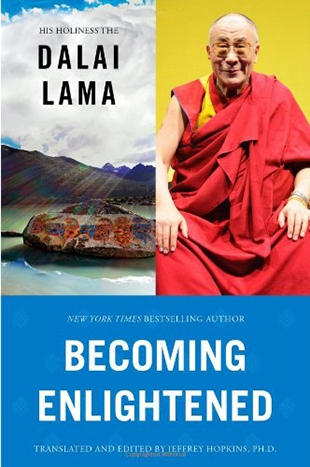His Holiness the Dalai Lama describes Buddhist teachings on meditation, morality, and selflessness as being like a lamp, dispelling ignorance; the supreme form of wealth; the best of friends; medicine for internal development; and the best of gifts. He notes:
"The purpose of listening to and studying Buddhist doctrines is to overcome the three poisons of afflictive emotions — lust, hatred, and ignorance — and to engage in altruistic practices so you can achieve an all-knowing state that will enable you to help others on a vast scale."
In a world rife with widespread hunger, violence, and suffering, the Dalai Lama offers a message of altruism and compassion. In this profound and eminently practical book, he offers three levels of spiritual practice that can transform our lives and the ways we act every day. In a section on the initial level of practice, the Dalai Lama presents ideas and exercises for exploring our fortunate situation, for knowing that you will die, for thinking about future lives, for identifying the refuge, and for dealing with karma. He quotes Atisha who said:
"Since this body of complete leisure and opportunity
Was very difficult to get, and once obtained
Will be very difficult to have again,
Make it meaningful by striving to practice."
The challenge is to become "a highly endowed human being" who puts others first through selflessness, generosity, and compassion.
At the middle level of spiritual training, the Dalai Lama probes the meaning of suffering, the battle against the afflictive emotions, and the implications of impermanence. In the final section of the book on a high level of practice, the author zeroes in on altruism, engendering great compassion, switching self and other, viewing reality, the way to analyze, and Buddhahood. Here the Dalai Lama hits high stride with insights such as the following:
"The way to rise to a higher level of spiritual practice is to develop altruism to the point where seeking enlightenment in order to serve others more effectively becomes your inner motivation for everything you do."
For the Dalai Lama, a beautiful internal attitude is more important than external beauty. In light of this truth, practicing meditation, developing equanimity, finding everyone dear, reciprocating the kindness of others, and cultivating love are all essential beauty aids or enhancers. Becoming Enlightened is translated and edited by Jeffrey Hopkins, who served for a decade as the interpreter for the Dalai Lama; he is himself the author of more than 40 books and translations.
